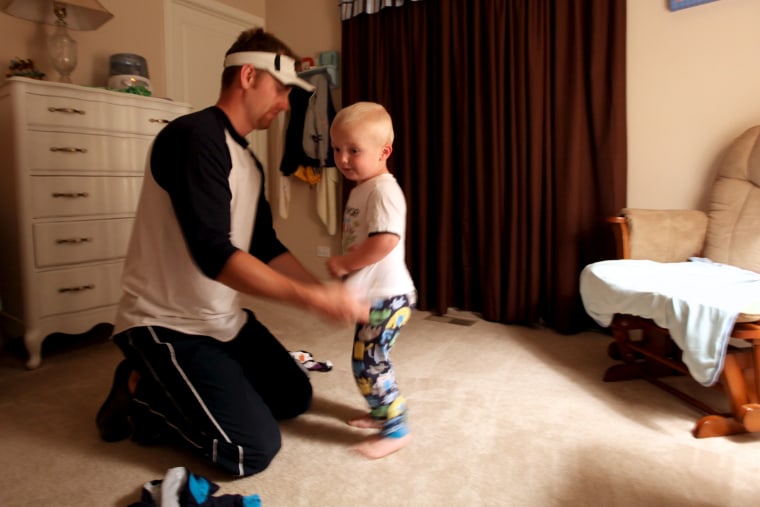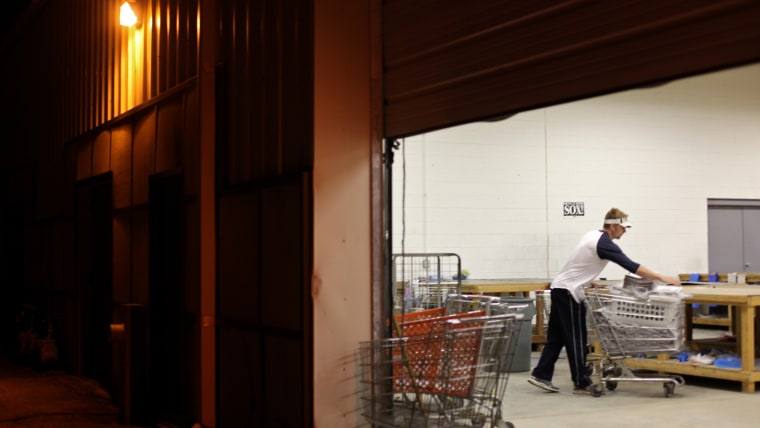Even in a tough economy, most people would probably think of a job that requires you to get up around 2 a.m. as a worst-case scenario. Not Cory Hallahan.
“It’s a great thing,” said Hallahan, 30, who works at night so he can be a stay-at-home dad by day. “I’m home by 6 a.m., so I don’t miss any time (the) kids are awake.”
As the recession has prompted more Americans to tighten their belts, some people are seeking out overnight shifts so they can save money on child care costs, earn some extra cash, avoid rush hour traffic or go to school by day, staffing experts say.
“You have folks that specifically search out those off-shifts because of different circumstances in their life,” said Jason Bovey, Western regional vice president for Randstad Inhouse Services, a staffing firm.
Only about 15 percent of full-time employees were working non-traditional shifts in 2004, the last time the Bureau of Labor Statistics collected such data. Only about 3 percent of those full-time workers were working the night shift, while about 5 percent were working the evening, or swing, shift, according to the BLS. The rest were working other odd schedules.
It’s a small group, and Bovey said it can be difficult to find the right people who can handle working while nearly everyone else is asleep. But some who do work nights say they couldn’t imagine it any other way.
Working at night, raising kids by day
Hallahan was working as a real estate agent until the housing market went bust. That's when he and his wife decided that it would be better for the family, and make more financial sense, for one of them to stay home with the couple's three kids, who are all under 5.

His wife works as a second grade teacher, so she became the primary breadwinner. In addition to his seven-day-a-week job delivering newspapers in the wee hours of the morning, Hallahan does a little bit of real estate work during the day, while the kids nap.
The system does have its tradeoffs.
At 7:30 p.m., when many families might be sitting down to dinner, Hallahan is often heading to bed.
The kids are usually in bed by 5:30 or 6 p.m., so evening activities are largely out of the question. It can be hard to even stay up to watch his favorite Notre Dame football team’s games.
“You do miss out on a few things,” said Hallahan, who lives in Cortland, Ill.
Their finances are tight, and Hallahan said he usually gets only about six hours of sleep a night, even though he tries to head to bed early.
But Hallahan said he thinks the sacrifices are worth it so he can be with the kids, and he hopes to keep the schedule for a while. One key, he says, is that he likes the job, and even the hours.
“It’s pretty quiet, but I guess I don’t mind that at all,” he said. “I like being out there, kind of by yourself.”
Night shift a fact of life
Although some companies cut back on night shifts during the recession, some of that work may be coming back now that the economy is improving. And in today's 24/7 environment, where people might want technical help at 2 a.m. and groceries at 4 a.m., night shifts are a permanent feature of many industries.
“People are unwilling to wait, as they used to, for service,” said Rebecca Rogers Tijerino, senior vice president with staffing firm Adecco.
Daniel Greenberg, chief marketing officer with job search aggregator SimplyHired.com, said job listings for the night shift have grown as job listings in general have improved in the current weak recovery. Popular job types that call for night shift work include pharmacists, registered nurses and security guards, he said.
Nontraditional shifts tend to pay a bit more, because some companies offer a night differential. Bovey, of Randstad, said an additional 50 cents an hour can mean a lot to some people, especially in jobs that pay between $9 and $12 an hour.
Those who do them say there are other perks as well.
‘A little bit different breed’
Jim Mark, 55, likes working at night because there are no meetings, no office politics and lots of room for independent decision-making.
“I guess I’m an antisocial person, so if I don’t deal with the rest of humanity that’s just fine,” Mark said.
The evening air is also a lot cooler in the non-air conditioned shop at the local transport company where he works in Little Rock, Ark.
Mark enjoys riding his motorcycle home around 1 a.m., when there’s no traffic. And he likes spending his days in his garden, where he grows much of the food he eats in the summer months.
Still, there are downsides. He can’t go out with co-workers for a drink after work, because everything is closed. And he sometimes finds himself puttering around the house until 4 or 5 a.m. Then he ends up getting only a few hours of sleep.
“The sleep thing gets a little weird sometimes,” he said.
But Mark, who also has worked as a truck driver, said if he had to look for another job, he’d probably try to keep working nights.
“I think the people that work nights are a little bit different breed and have a little bit different mind-set,” he said. “I think we’re a little bit more independent thinkers.”
